Books /
Documents
Publications
Explore the books and reports authored by the researchers at the Institute of Geoeconomics.
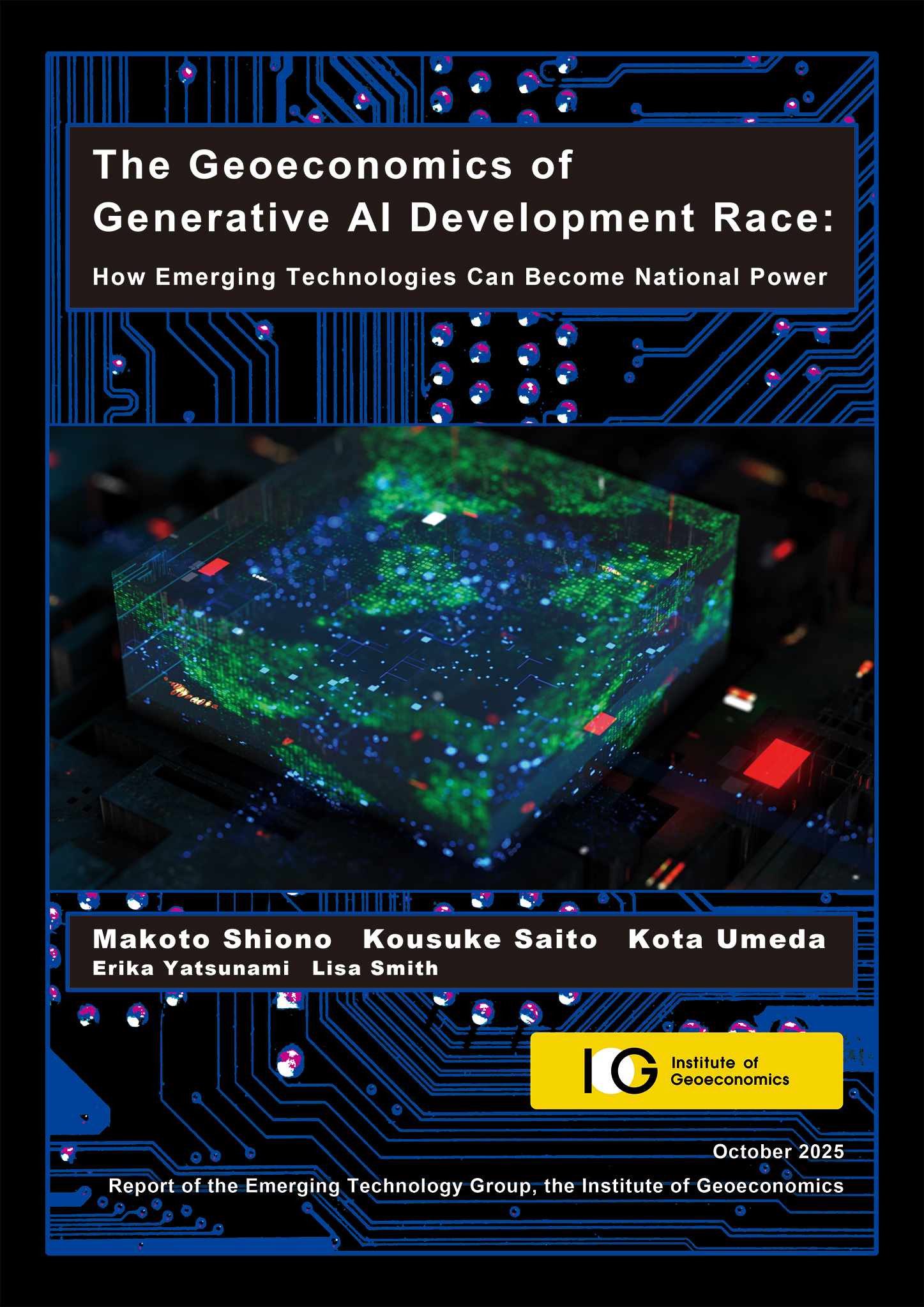
Author:
Makoto Shiono, Kousuke Saito, and Kota Umeda
Issued by:
Institute of Geoeconomics
First Edition:
October 27, 2025
The Geoeconomics of Generative AI Development Race: How Emerging Technologies Can Become National Power
Generative AI has been progressing at an incredible pace and has become one of the most closely watched emerging technologies. Its significance lies not only in its technical innovation but also in the fact that it has become a central arena in the global competition for technological supremacy. This report analyzes national strategies for generative AI development through the lens of competition for national power, comparing the approaches taken by the United States, China, Europe, and Japan. By systematically documenting and examining the rapidly accelerating AI development race, the report seeks to provide insight into this competition within the broader context of international politics.
Executive Summary
Author:
Hirohito Ogi and Rinatro Inoue
Issued by:
Institute of Geoeconomics
First Edition:
October 24, 2025 (English Version, January 2026)
From Decline to Surge: The Defense Industry in the Era of Excess Demand
As Japan’s security environment deteriorates, demand and expectations for its defense industry are rising sharply. This surge represents not only an opportunity for growth but also the emergence of a new structural challenge: a shortage of surplus production capacity. How is Japan’s defense sector adapting to this new “Age of Excess Demand,” and what role can government play in supporting it? Drawing on interviews with defense firms and international case studies, this briefing offers concrete policy recommendations for steering Japan’s defense industry from decades of stagnation towards a new phase of expansion.
・Chapter 1 Japan's Rapidly Shifting Defense Industry
・Chapter 2 The Trajectory of the U.S. and European Defense Industries
・Chapter 3 Policy Recommendations
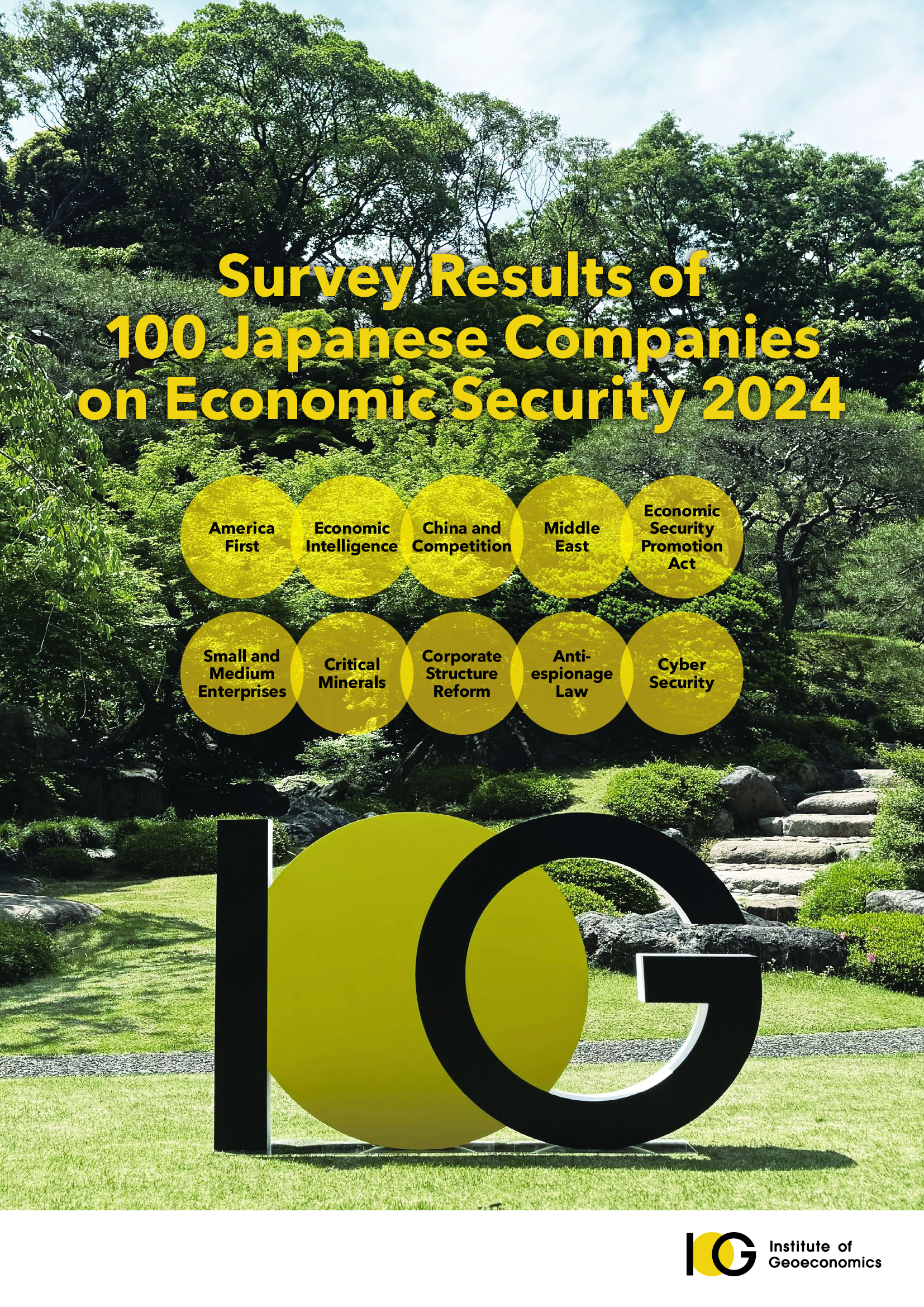
Author:
Project Members of the 100 Japanese Companies on Economic Security 2024
Issued by:
Institute of Geoeconomics
First Edition:
September 12, 2025
Survey Results of 100 Japanese Companies on Economic Security 2024
The Institute of Geoeconomics conducted the “Survey Results of 100 Japanese Companies on Economic Security 2024” between November 2024 and January 2025. This year’s survey 2024 reveals that while there has been no significant retreat in Japanese companies’ emphasis on the U.S. market, the recognition that “the U.S. itself is seen as a geoeconomic risk” has spread among Japanese companies. Accompanying this development, it is noteworthy that one in four companies is considering internal organizational restructuring and strengthening, such as enhancing economic intelligence capabilities in Washington, D.C. Starting this year, this booklet aims to provide more focused and concise columns than in previous years, in addition to analysis on the survey results.
Survey Results
Column: U.S. Risks and Opportunities: Japanese Companies Becoming Proactive Geoeconomic Actors Through Enhancing Long-term Adaptivity
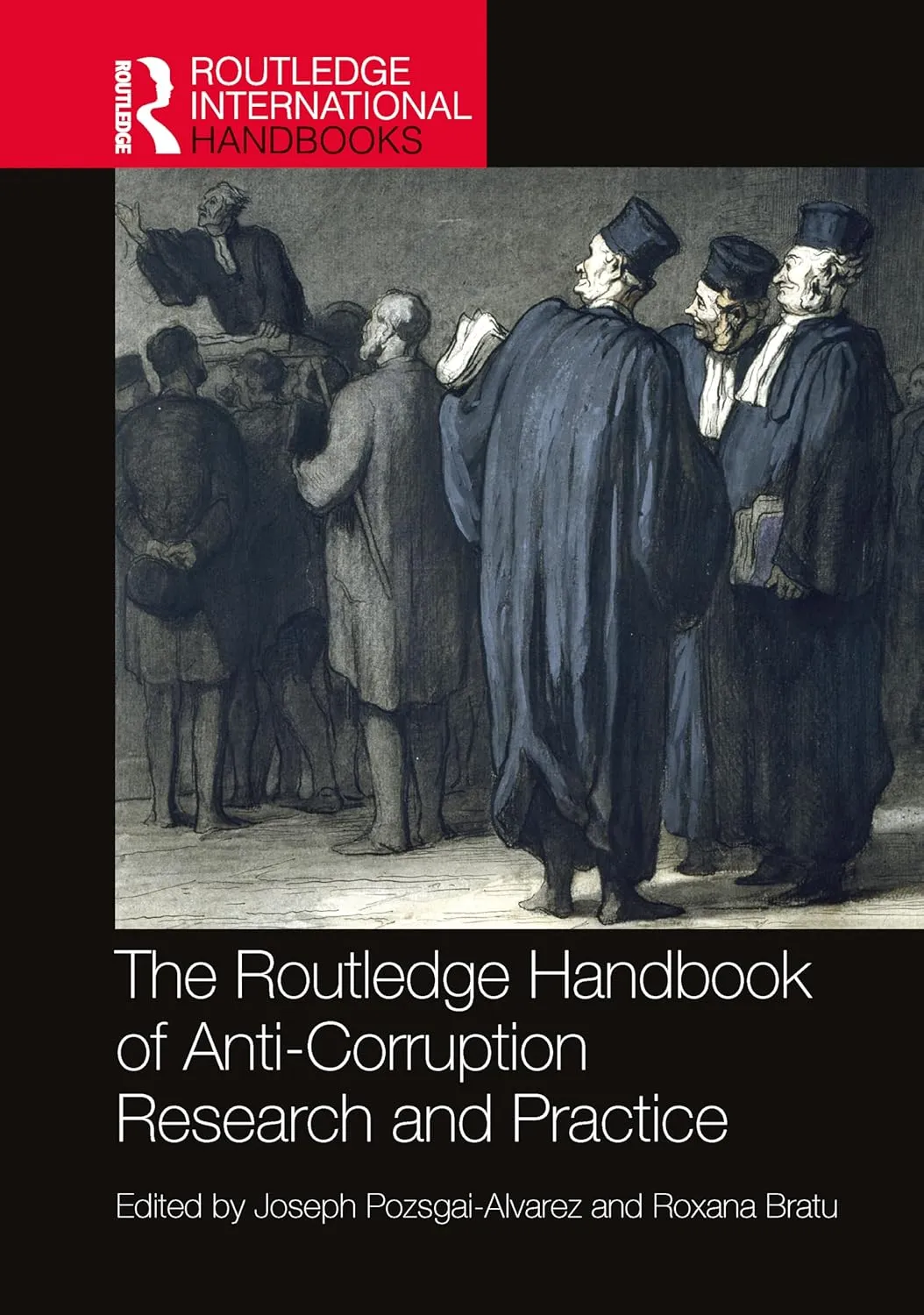
Author:
Joseph Pozsgai-Alvarez and Roxana Bratu (Eds)
(Yusuke Ishikawa: chapter 24)
Issued by:
Routledge
First Edition:
June 30. 2025
NGOs, Advocacy, and Anti-Corruption
Yusuke Ishikawa, Research Fellow, contributed a chapter in Routledge Handbook of Anti-Corruption Research and Practice. His chapter discusses lobbying and advocacy strategies and practices for policy change implemented by anti-corruption NGOs. Based on interviews, campaigners’ essays, and secondary sources, the chapter explores not only the methods NGOs use to shape policy decisions, but also the circumstances under which they gain access to policymakers and influence public opinion. It further investigates the extent of their impact on political decisions and the conditions that enhance their influence on such reforms.

Author:
Project Members of the 100 Japanese Companies on Economic Security 2023
Issued by:
Institute of Geoeconomics
First Edition:
December 27, 2024
Survey Results of 100 Japanese Companies on Economic Security 2023
The Institute of Geoeconomics conducted the “Survey Results of 100 Japanese Companies on Economic Security 2023” between November 2023 and January 2024. Survey responses were collected from 83 companies, with a preliminary report released on January 10, 2024, followed by a comprehensive booklet published on December 27, 2024.
Summary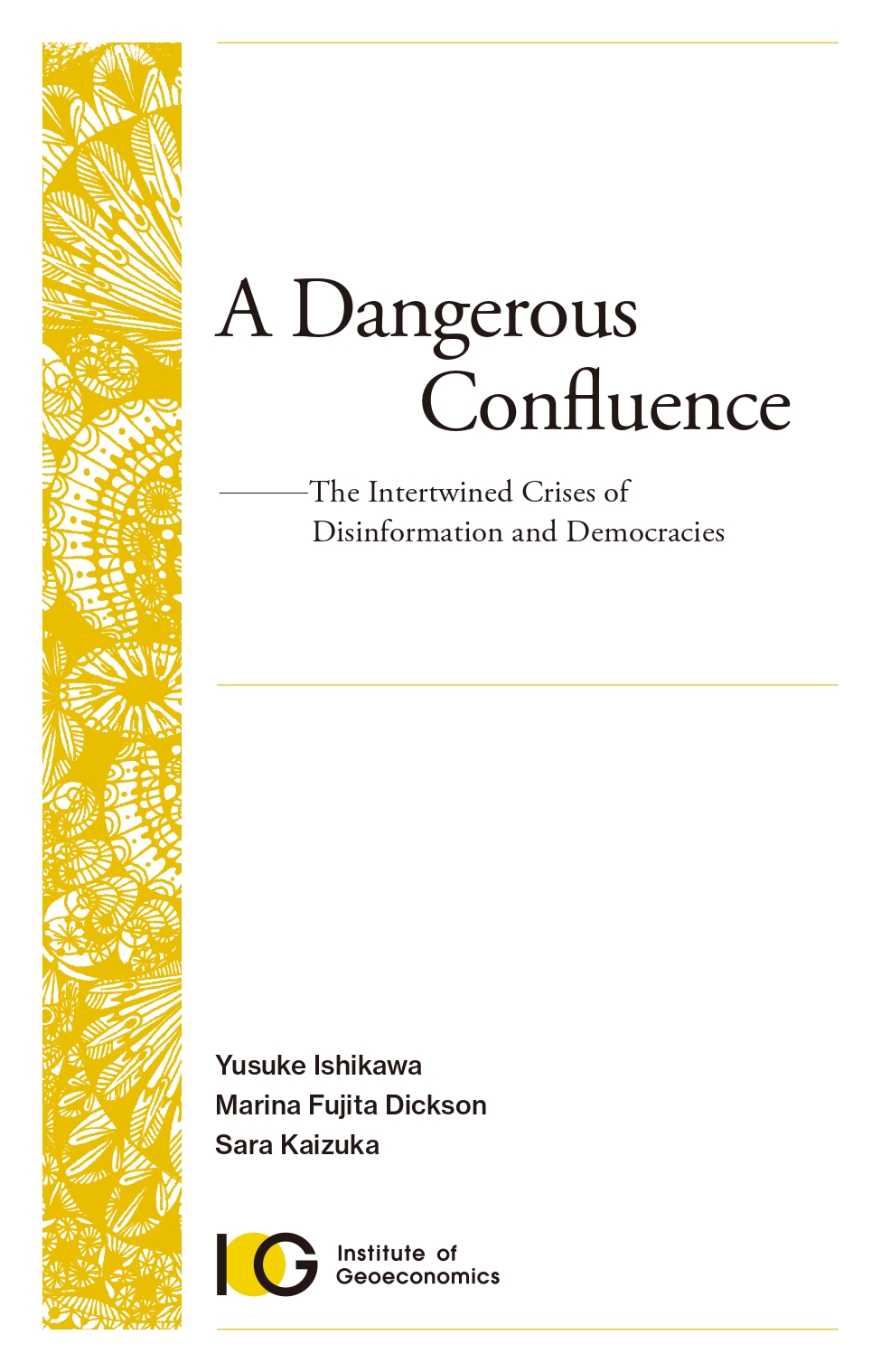
Author:
Yusuke Ishikawa, Marina Fujita Dickson, Sara Kaizuka
Issued by:
Institute of Geoeconomics
First Edition:
November 20, 2024
A Dangerous Confluence: The Intertwined Crises of Disinformation and Democracies
In 2024, dubbed ‘the election year’, there is a heightened awareness of the threat of disinformation. Disinformation poses a fundamental threat to the very functioning of liberal democracies through its capacity to polarize societies and sow doubt in public discourse. Given disinformation’s ubiquitous presence with the growing use of new technologies, three early career researchers from the Europe and Americas group within the Institute of Geoeconomics (IOG) conducted a six-month research project between January and June 2024 on the relationship between democratic backsliding and disinformation. This report analyzes three select case studies, Hungary, the United States, and the United Kingdom, focusing on the current state of disinformation, their policy responses, and the impact of disinformation in each country context. We conclude by analyzing the current state of disinformation in Japan, and provide five policy recommendations for Japan.
Chapter 2 The United States: When Distrust Trumps Facts
Chapter 3 The United Kingdom: The Engagement Trap and Disinformation in the United Kingdom
Concluding Chapter Japan: Disinformation during Crises
Policy Recommendations
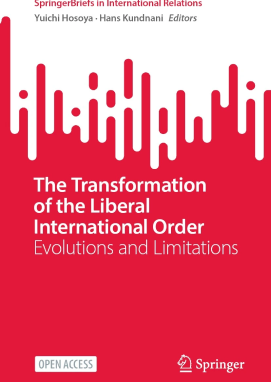
Author:
Hans Kundnani, Yuichi Hosoya
Issued by:
Springer; 1st ed.
First Edition:
Oct 25, 2023
The Transformation of the Liberal International Order
This open access book aims to emphasize the potential for Japan, Europe and Indo-Pacific countries including the US to respond to shared domestic and international challenges on finding joint ways to uphold and develop the liberal international order (LIO) in the Asian Pacific region and the world. It explores how these countries and the region (the EU) can work together to promote solidarity and cooperation to advance democratic standards and rules-based norms globally. The US understands the LIO in a political sense and centers its focus on democracy, aiming to build a coalition of democracies opposed to China and Russia which represent a kind of authoritarian axis. The US aims both to defend the LIO and respond to the China challenge and to build a coalition of countries that will do both. In contrast European countries aim at defending the “rules-based order”―a term preferred because they fear that the concept of the LIO might alienate or antagonize non-democratic countries. They face a dilemma between working with China to reform the LIO or, in seeking to defend it from China, excluding China. Germany and France differ regarding whether to play a passive or active role in the Indo-Pacific, the former choosing to preserve peace and stability for continued exports, and, until recently, doing little to contribute to security. Its views echo those of the ASEAN countries, which are unable or unwilling to take an active role in protecting the LIO. On the contrary France, along with the UK, actively carries out presence operations in the Indo-Pacific. Rather than upholding US dominance, France supports a multipolar order that will also reduce China’s influence in the region, with France acting as a balancing power and offering an alternative to the choice between China and the United States. Japan and India show interest in European views with the former leaning more toward its allies, the US and AUKUS, and the latter seeing Europe less as an alternative to the status quo and more as a complement of QUAD. This book concludes that the US needs to build coalitions rather than forcing allies and neighbors to choose sides, while Japan, Asian countries, and Europeans should more actively reform the LIO.
American Strategy and the Liberal International Order (Zack Cooper)
East Asia, Europe and the High Sea: The Geostrategic Trinity of the U.S.-Led Order (Luis Simón)
The EU’s Connectivity Strategy 2.0: Global Gateway in the Indo-Pacific (Maaike Okano-Heijmans)
Germany’s Indo-Pacific Turn: Towards a Contribution to the Rules-Based Order? (Alexandra Sakaki)
France’s Indo-Pacific Approach: Salvaging the Rules-Based Order and Staying Relevant (Céline Pajon)
India, the Quad, and the Liberal International Order (Dhruva Jaishankar)
Countering Chinese Economic Coercion and Corrosive Capital in Southeast Asia (Nithin Coca)
The Challenge of China for the Liberal International Order (Richard McGregor)
Northeast Asia’s Energy Transition–Challenges for a Rules-Based Security and Economic Order (Kun-Chin Lin, Tim Reilly)
The Liberal International Order and Economic Security (Kazuto Suzuki)
The Future of the Liberal International Order (Hans Kundnani)
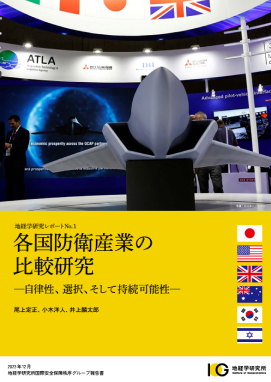
Author:
Sadamasa Oue, Hirohito Ogi, and Rintaro Inoue
Issued by:
Institute of Geoeconomics
First Edition:
2023.10.30
Comparative Study of Defense Industries -Autonomy, Priority, and Sustainability-
Amid the push for fundamental reinforcement of defensive capabilities following the release of three strategic documents, there’s a growing sense of crisis being expressed toward Japan’s defense industry. What are the challenges and their underlying causes? Are the currently proposed solutions appropriate? Through comparative studies of Japanese and overseas cases, we will discuss policy options for strengthening Japan’s defense industry.
International Overview of Defense Industrial Policy
Challenges for Japan’s Defense Industry: The Pitfall of Investment without Prioritization
Recommendations Based on a Survey of the Defense Industry in Each Country
Policy Recommendations
Conclusion: Encourage Dynamism and Consolidate Demand

From Decline to Surge: The Defense Industry in the Era of Excess Demand
(First edition: October 24, 2025 (English Version, January 2026))

Survey Results of 100 Japanese Companies on Economic Security 2024
(First edition: September 12, 2025)

A Dangerous Confluence: The Intertwined Crises of Disinformation and Democracies
(First edition: November 20, 2024)

The Transformation of the Liberal International Order
(First edition: Oct 25, 2023)

Comparative Study of Defense Industries -Autonomy, Priority, and Sustainability-
(First edition: 2023.10.30)

